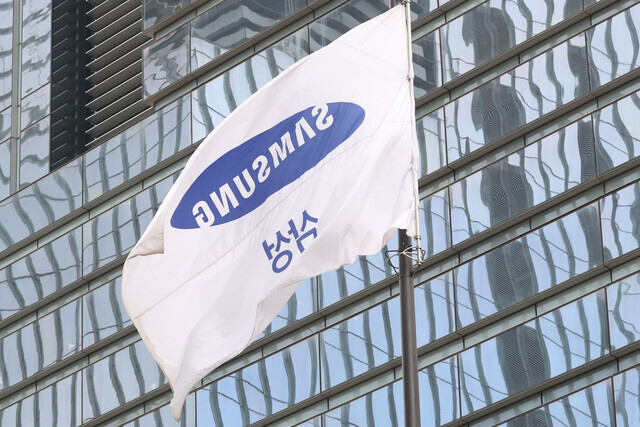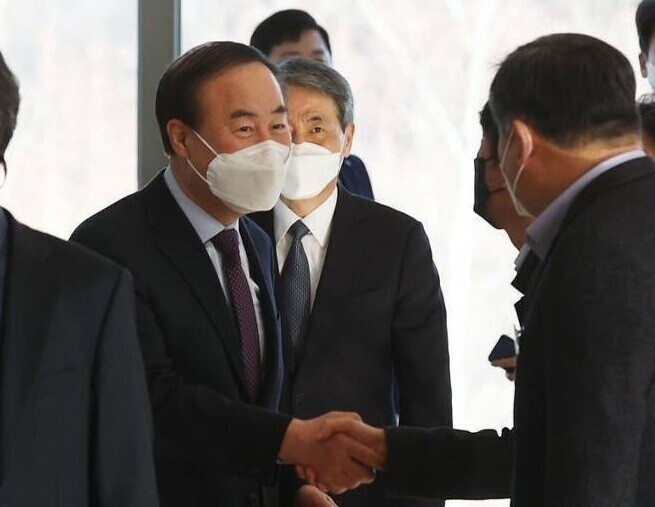hankyoreh
Links to other country sites 다른 나라 사이트 링크
Desperate to boost competitiveness, Samsung calls up old guard to run chip business

Samsung Electronics’ surprise decision to replace the head of its semiconductor operations shows signs of a sense of alarm at the company.
Not only did the isolated appointment happen less than six months after regular appointments were made, but it also marked the return of a so-called “old boy” in defiance of the company’s previously announced approach of “changing the generational guard.”
For this reason, some are suggesting the company’s high-bandwidth memory (HBM) and other semiconductor business may be in even worse shape than has been reported. Attention is now focusing on whether Samsung Electronics will succeed with its strategy of bringing back a veteran in an era when the industry environment has been rapidly shifting.
According to an announcement made by the company on Tuesday, Jun Young-hyun, 64, was named to head its device solutions (DS) division less than half a year after becoming leader of the future business division.
The future business division was created by Samsung Electronics in late November of last year with the stated goal of “discovering new projects that are not extensions of existing ones.” As its first leader, it named Jun, who was then chairperson of the board at Samsung SDI.
Now Jun has been transferred once again to head the company’s semiconductor operations. This explains the response from observers, who said the appointment showed signs of urgency on the company’s part.
The move was read as being based on the determination that the situation at Samsung Electronics’ semiconductor business is dire enough to warrant such an action.
As recently as last year, the poor performance was largely due to worsening business conditions. But this year, observers are suggesting that Samsung Electronics semiconductors have been left out of the intensifying artificial intelligence wave. The reason for that assessment is the company’s lie in the company’s struggles in the competition over HBM, which has emerged as an essential part of AI.
While competitors began providing 5G (HBM3E) items to Nvidia around March, Samsung Electronics is still undergoing testing at the company on its 4G (HBM3) and 5G samples. For this reason, some interpreted the latest announcement as an indirect rebuke of the DS division president, Kyung Kye-hyun.
The dismal prospects extend to the semiconductor sector in general. The company’s foundry business, which remained consistently in the red during the first quarter, has seen its market share plummet. According to figures from the Taiwanese market research provider TrendForce, Samsung Electronics’ foundry market share fell from 15.5% to 11.3% between 2021 and last year.
The same climate was evident in its first-quarter performance. While the company’s semiconductor business successfully recorded a surplus on the strength of improving business conditions during that quarter, the scale of its operating profits was just 1.91 trillion won, compared with 2.89 trillion won for competitor SK Hynix. Given that its sales were roughly double those of SK Hynix, Samsung fell far short in terms of profitability.
Many in and around Samsung Electronics are now watching to see whether Jun applies the same strategy he previously adopted with the company’s battery business.

Samsung insiders suggested he was selected on the basis of his performance as CEO at Samsung SDI, where he was seen as having spearheaded stable growth rather than focusing on building up scale.
In contrast with other rechargeable battery makers who secured clients through an aggressive approach to orders and large-scale investment, Samsung SDI focused on bolstering quality, forgoing expansions in market share while reexamining its projects.
But it remains unclear whether the same strategy will work in the semiconductor industry, which has been shifting due to recent rapid advancements in AI technology and frictions between the US and China. For this reason, the “old boy’s” return is being met with a mixture of anticipation and concern.
Jun and his fellow 64-year-old Co-Vice Chairperson Chung Hyun-ho are Samsung Electronics’ oldest current executives. His appointment stands in marked contrast with the company’s emphasis on “young leaders” and “hastening the changing of the guard” when it made its appointments late last year.
“Appointments are supposed to send a message, but it’s hard to see what clear message can be found in the latest appointment,” one industry source said.
“It looks like they decided that because they’re facing a crisis, they wanted to approach appointments in a conservative way,” they suggested.
By Lee Jae-yeon, staff reporter
Please direct questions or comments to [english@hani.co.kr]

Editorial・opinion
![[Editorial] It’s time for us all to rethink our approach to North Korea [Editorial] It’s time for us all to rethink our approach to North Korea](https://flexible.img.hani.co.kr/flexible/normal/500/300/imgdb/original/2024/0621/7517189559819182.jpg) [Editorial] It’s time for us all to rethink our approach to North Korea
[Editorial] It’s time for us all to rethink our approach to North Korea![[Column] Why empty gestures matter more than ever [Column] Why empty gestures matter more than ever](https://flexible.img.hani.co.kr/flexible/normal/500/300/imgdb/original/2024/0619/7217187833478369.jpg) [Column] Why empty gestures matter more than ever
[Column] Why empty gestures matter more than ever- [Editorial] Seoul’s part in N. Korea, Russia upgrading ties to a ‘strategic partnership’
- [Column] The tragedy of Korea’s perpetually self-sabotaging diplomacy with Japan
- [Column] Moon Jae-in’s defense doublethink
- [Column] S. Korea-China cooperation still has a long way to go
- [Editorial] Seoul must use tact and diplomacy to check deepening Russia-NK ties
- [Editorial] Thorough audit, evaluation of oil test drilling are needed
- [Editorial] Yoon prioritizes his administration over South Korea’s safety once again
- [Column] The monumental shift in N. Korea’s nuclear program that never happened
Most viewed articles
- 1[News analysis] N. Korea’s new pact with Russia is ‘mirror image’ of Yoon’s alliance with US
- 2[Editorial] It’s time for us all to rethink our approach to North Korea
- 3Seoul decries N. Korea-Russia mutual defense pact as ‘absurd’
- 4North Korea’s real motive for publishing the full text of new treaty with Russia
- 5Hot weather hat trick to send the mercury soaring in Korea
- 622 years later, Korean girls killed by US troops remain a symbol of the price of military tensions
- 7[Column] Why empty gestures matter more than ever
- 8[Editorial] Fortified N. Korea-Russia ties should be a wakeup call for Seoul
- 9Park‘s address from 10 years come back to her
- 10The harrowing real-life stories of the Korean military coup depicted in “12.12: The Day”